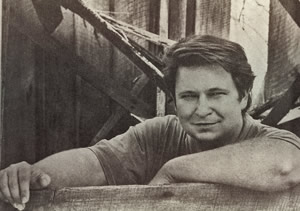 This Goodly Land
This Goodly Land
Rick Bragg (July 26, 1959–present)

Other Names Used
- Ricky Edward Bragg: full name
Alabama Connections
- Piedmont, Calhoun County: birthplace
- Possum Trot, Calhoun County: childhood residence
- Jacksonville, Calhoun County: brief adult residence
- Anniston, Calhoun County: brief adult residence
- Birmingham, Jefferson County: brief adult residence
- Fairhope, Baldwin County: adult residence
- Tuscaloosa, Tuscaloosa County: adult residence
Selected Works
- Bragg, Rick. All Over But the Shoutin'. New York: Pantheon, 1997.
- Bragg, Rick. Somebody Told Me: The Newspaper Stories of Rick Bragg. Tuscaloosa: University of Alabama Press, 2000.
- Bragg, Rick. Ava's Man. New York: Knopf, 2001.
- Bragg, Rick. I Am a Soldier, Too: The Jessica Lynch Story. New York: Alfred A. Knopf, 2003.
- Bragg, Rick. The Prince of Frogtown. New York: Alfred A. Knopf, 2008.
Literary Awards
- Distinguished Writing Award, Non-deadline Writing, American Society of Newspaper Editors, 1991
- Pulitzer Prize, Feature Writing, 1996, for New York Times articles written about contemporary America
- Alabama Author Award, Alabama Library Association, 1998, for All Over But the Shoutin’
- Alex Award, American Library Association and Margaret Alexander Edwards Trust, 1998, for All Over But the Shoutin’
- Harper Lee Award for Alabama's Distinguished Writer, Alabama Writers' Forum and Alabama Writers Symposium, 2009
Biographical Information
Rick Bragg was born in Piedmont, Ala. His parents’ marriage was troubled, and the family moved frequently. Eventually, Bragg and his mother and brothers moved into his grandmother’s house near Possum Trot, Ala. Although an average student, Bragg read extensively as a boy. He began his writing career working for his high school newspaper, then wrote for his college newspaper while enrolled in a journalism class at Jacksonville State University. He left JSU to write about sports for The Jacksonville News. After leaving that position, he worked for The Anniston Star and The Birmingham News. From there, Bragg took a job with the St. Petersburg [Fla.] Times, where he covered stories of national interest, including the devastation caused by Hurricane Andrew and the turmoil associated with the rise of Jean-Bertrand Aristide in Haiti.
In 1992, Bragg was awarded a Neiman Fellowship to study journalism at Harvard University for a year. In 1994, he began working as a reporter for the New York Times, initially based in New York but soon working as a national correspondent in the Southern Bureau from Atlanta. Bragg won the Pulitzer Prize in 1996 for his human interest stories published in the The New York Times. His first book, the autobiographical All Over But the Shoutin’, was published in 1997. Bragg continued to report for the The New York Times and to write books on the side until 2003, when he resigned from the newspaper to write books exclusively. He resides in Tuscaloosa and is a Professor of Journalism at the University of Alabama.
Interests and Themes
In his books, Rick Bragg gives a voice to Southern poor whites. In his newspaper articles, he gives a voice to the struggling underclasses of all races and locales. In all his writing, he tells his stories in language that is powerful and honest but respectful of his subjects.
For More Information
Please check your local library for these materials. If items are not available locally, your librarian can help you borrow them through the InterLibrary Loan program. Your librarian can also help you find other information about this author.
There may be more information available through the databases in the Alabama Virtual Library. If you are an Alabama citizen, AVL can be used at your public library or school library media center. You can also get a username and password from your librarian to use AVL at home.
Reference Articles
- Weldon, Amy E. "'When Fantasy Meant Survival': Writing, Class, and the Oral Tradition in the Autobiographies of Rick Bragg and Harry Crews". Mississippi Quarterly 53.1. (1999): 89-110.
Reference Web Sites
- Cardwell, Lynda. "Rick Bragg". Salon.com. 2001. http://dir.salon.com/people/bc/2001/12/13/bragg/index.html .
- Kingsbury, Pam. "Rick Bragg". The Encyclopedia of Alabama. 2008. Alabama Humanities Foundation and Auburn University. http://www.encyclopediaofalabama.org/face/Article.jsp?id=h-1881.
Photo courtesy of the Caroline Marshall Draughon Center for the Arts & Humanities in the College of Liberal Arts, Auburn University.
Last updated on Apr 30, 2009.